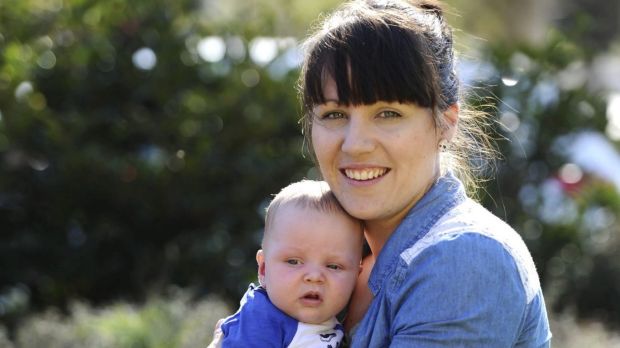Researchers from the University of Canberra found mums who piled on additional kilos between babies also put their own health in danger.
 Canberra mum Kylie Manning said while she didn’t monitor her weight during her first pregnancy, she was especially mindful of it during her last two. Photo: graham.tidy@canberratimes.com.auThe study analysed the body mass index of nearly 15,000 women over six years before and after pregnancy.
Canberra mum Kylie Manning said while she didn’t monitor her weight during her first pregnancy, she was especially mindful of it during her last two. Photo: graham.tidy@canberratimes.com.auThe study analysed the body mass index of nearly 15,000 women over six years before and after pregnancy.
They compared this to the rates of caesarean sections, gestational diabetes and hypertension, as well as neonatal health issues.
They found women whose BMIs increased by three points between pregnancies risked their babies having low blood glucose levels and breathing difficulties, regardless of their weight at the start of the study.
The women also faced an increased risk of developing gestational diabetes and high-blood pressure.
These health issues were the same ones that faced women who had a BMI above 25 before becoming pregnant.
University of Canberra nursing and midwifery professor Deborah Davis said while there was plenty of research that proved the risks overweight and obese women faced while pregnant, this was the first time in Australia weight change between pregnancies was proven to have an impact.
“I think the most significant thing is even if you’re a normal weight, if you have a BMI change between pregnancies in the magnitude of three BMI units then that’s going to impact negatively on your next pregnancy,” Professor Davis said.
Canberra mum Kylie Manning said while she didn’t monitor her weight during her first pregnancy, she was especially mindful of it during her last two due to the well publicised risks.
During her most recent pregnancy, she said exercised up until 37 weeks and tried to eat well to keep her health in check.
“I was more aware of just how different and improved you can feel if you actually pay attention to nutrition and exercise during your pregnancy [the second time around],” she said.
“It does matter. [Pregnancy] is not a free pass. It’s hard to fix later,” she said.
If your BMI has risen between pregnancies, Professor Davis said there are measures you can take to help protect the health of your baby. My first and second were vastly different in terms of the pregnancy, birth and recovery
“If you limit your weight gain during your pregnancy you’re more likely to come back to your pre-pregnancy weight rather than carrying additional weight into another pregnancy,” Professor Davis said.
She said it was important for women to discuss their weight with their health care providers during their pregnancy.
“Weight’s a really sensitive issue for women and I think that it can be hard for health carers to raise the issue with them,” Professor Davis said.
“I’d really love women to raise the issue with their health carers and be direct and say ‘what’s ideal for me in this pregnancy and what strategies are there for me to normalise my weight when I’ve had the baby?’.”
